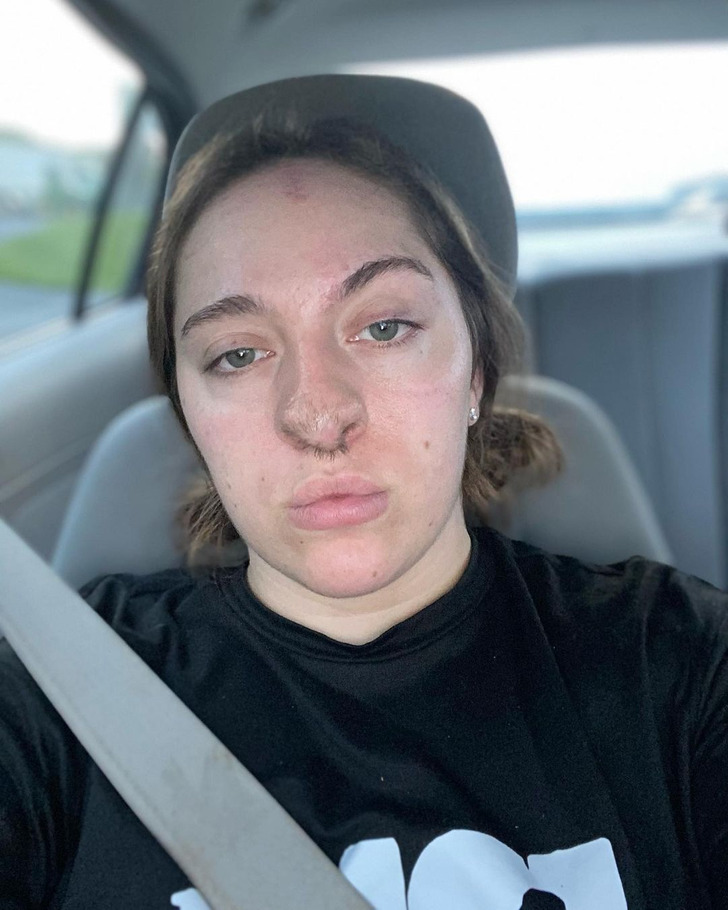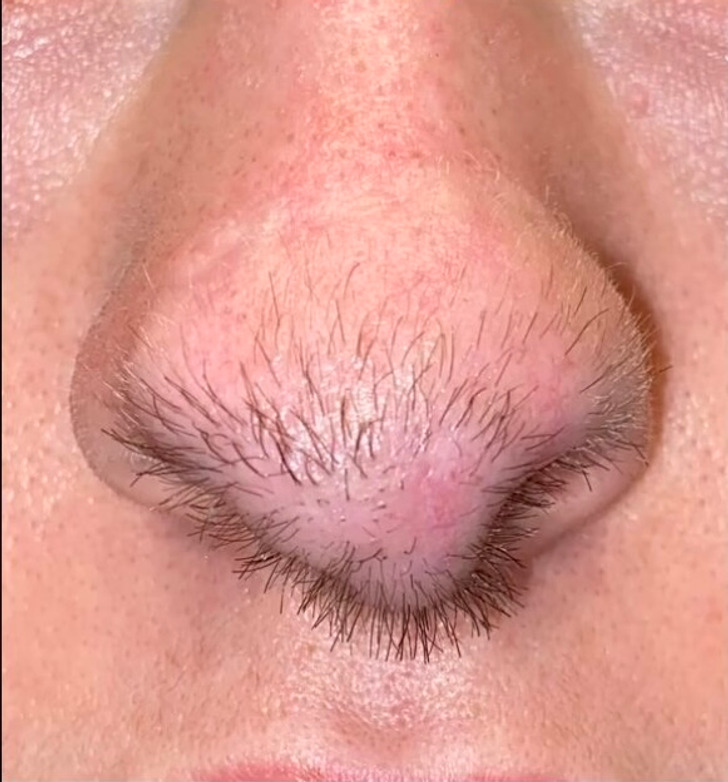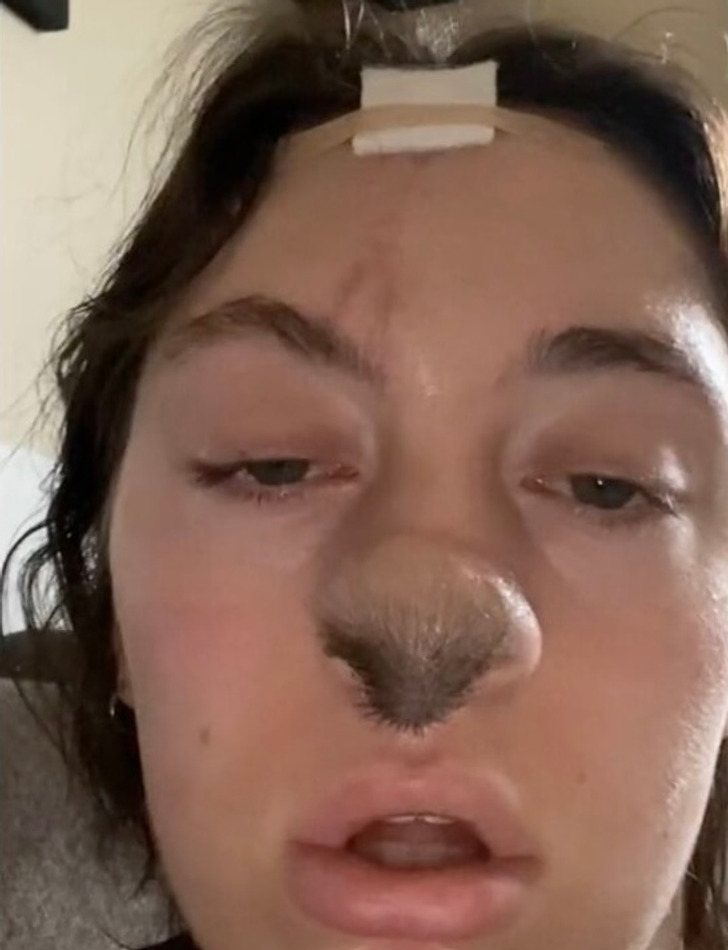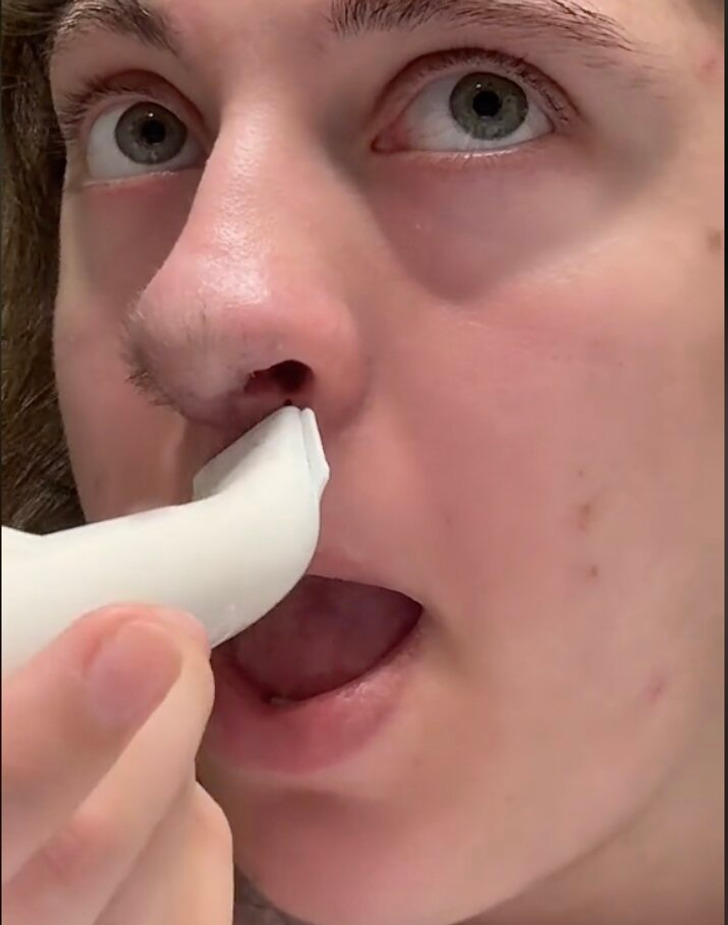A woman whose nose was ripped off in a vicious dog attack now has hair growing out of her skin grafts. What she’s going through is as odd and rare as it sounds, and it has left everyone shocked. Read on to discover her story.
She was attacked by her dad’s rescue dog.

In September 2022, Trinity Rowles’ life took a dramatic turn when her dad’s rescue dog attacked her. The dog, a Pitbull-Bulldog mix named Irish, had always been a gentle giant, more like a “great big teddy bear.” Trinity often looked after him, especially when her dad was away. But on that fateful day, after an argument with her dad, the tension in the house may have set Irish off.
Trinity remembers the attack as completely out of character for Irish. She explained that breeds like Irish are very emotional and can react unpredictably in high-stress situations. “Animals can only communicate in so many ways,” she said. When she started to walk away, Irish suddenly attacked, leaving her shouting that the dog was biting her nose.
Rowles has very blurred memories about the episode.

the hospital, and after that, her memories were a bit fuzzy.
The recovery had been long and painful.

Trinity Rowles was in the hospital for four days after the attack and then had to go back for surgery to fix her nose. At just 20 years old, she’s already had four surgeries and might need up to six more to repair her face. One of the surgeries involved a skin graft from her forehead and scalp, which even led to hair growing on her new nose, something she is struggling with every day.
The whole experience left Trinity with PTSD (post-traumatic stress disorder), causing her frequent flashbacks, trouble sleeping, and a need for therapy and medication. To help cover the costs, a fundraiser was set up, and so far, over $6,400 has been raised toward the $10,000 goal.
The attack has shaken Trinity’s confidence, making it hard for her to accept her new appearance. She’s now much more aware of the dangers dogs can pose, something she hadn’t thought about before. On top of everything, she’s struggling with the mental impact of having hair grow on her nose, forcing her to shave twice per week.
She now has a whole community following her journey on social media.

The 21-year-old has been sharing her recovery journey on TikTok, posting updates about her healing process, including the unexpected hair growth on her nose. In a recent video titled “Let’s remember to be nice to humans,” she reintroduced herself to her audience, many of whom know her from the attack by a family member’s dog.

In the post, she expressed her gratitude to those who have supported her from the beginning and took a moment to address her critics. She acknowledged her appreciation for her supporters and suggested that despite the negativity from some, her experience has allowed her to connect with others who have faced similar situations.
Here, we explain why some hair can grow in extremely odd ways.
Men Mock Sister for Inheriting Old Barn, Money Falls at Her Feet as She Enters It – Story of the Day

After Alice’s grandfather passed away, she was shocked to learn that he had left everything to her brothers, even though he was closest to her. However, after paying a visit to the old barn she had inherited, she stumbled upon something that would change her and her family’s lives forever.
Advertisement
Alice was the only daughter of her parents and had two older brothers, Jake and Ashton. Her parents both worked on cruise ships in their younger years, which often required them to travel a lot.
Alice’s parents wanted stability for their children, so they made an agreement with the children’s grandfather, Bill, agreeing that the children would stay with him when they were away at work. As a result, Alice and her brothers spent much time with their grandfather growing up.

For illustration purposes only. | Source: Getty Images
Alice loved her grandfather dearly, and over the years, they built a solid relationship. It was not a grandfather and granddaughter relationship, but they were actual friends. Even after Alice’s parents had found stay-home jobs in the country, Alice still visited Bill on a regular.
Advertisement
Alice would discuss everything with her grandfather. He would tell her all his stories about his adventures over the years and his hard but joyful upbringing. Alice would tell him all of her dreams and the things she hoped to achieve in her life.
Unfortunately, Alice’s grandfather eventually passed on. This completely shattered Alice’s heart and brought her world tumbling. Losing her grandfather seemed to have changed everything for her.
Alice understood that he was of ripe age and had lived a long, fruitful life, and had passed away peacefully, but it didn’t make the pain any easier to bear. Her grandfather had become a friend she could count on, someone she could argue and laugh with.

For illustration purposes only. | Source: Getty Images
Advertisement
The time soon came for the family to address Bill’s will. Their grandfather had left most of everything to his grandchildren, so the meeting was between Alice, Jake, Ashton, and Bill’s lawyer, Lawrence. They all sat in Lawrence’s office as he explained who would get what.
“How could someone who brought such warmth and life suddenly be so cold and lifeless in a single moment?”
Jake and Ashton were eager to learn what they stood to gain as Lawrence read and explained their grandfather’s final wishes.
“Okay. So, what did he leave for us?” Jake asked impatiently.
“Yeah, what do I get?” Ashton added.
“Hold on. We’ll get there. I just want you to understand what your grandfather left behind. So, the estate of…” Lawrence started.

For illustration purposes only. | Source: Getty Images
Advertisement
Lawrence and her brother’s words faded into the background as Alice was engulfed by her thoughts. She sat there stoically, reliving the trauma of losing one of the people closest to her.
She remembered her mother’s bitter weeping when the doctor announced that her father was gone. She remembered kissing him for the last time and thinking, “How could someone who brought such warmth and life suddenly be so cold and lifeless in a single moment?”
Alice still had a lot to deal with, and Lawrence’s office was the last place she wanted to be. She still had so many questions. She was happy that her grandfather was at rest, but it didn’t make the pain any easier to digest.
“Something like what? You got left with peanuts, sis’. So much for all those summers at grandpa’s.”
“Alice, do you understand what I just said?” Lawrence asked, everyone now staring at her.
“Uhm… What?” Alice asked, snapping out and coming back to reality.

For illustration purposes only. | Source: Getty Images
Advertisement
“I said, the house will be going to your brothers. Bill left you the barn where his farm used to be. The farm itself was foreclosed, as you know. However, somehow your grandfather managed to make it independent from the property. So, you will have access to it even after it was repossessed,” Lawrence explained.
“Wow! A whole barn,” Jake said with a scoff as Ashton broke into laughter.
“Uhm… I strongly suggest you look into trying to salvage what you can from it. It won’t be much, but if you could at least make a deal with the new owners of the land, I’m sure you should be able to get something out of it,” Lawrence said empathetically.
“Something like what? You got left with peanuts, sis’. So much for all those summers at grandpa’s,” Ashton said as he and Jake erupted into laughter again.
Alice, unable to hold back her tears, grabbed her stuff and rushed out.

For illustration purposes only. | Source: Getty Images
Advertisement
“Oh, come on, Alice. We were just having a laugh,” Jake yelled as Alice exited.
Alice didn’t care much for Bill’s assets. What really tugged at her heartstrings was that this made her question her relationship with her grandfather. Her brothers had barely spent as much time with him or loved him as she did.
Alice’s grandfather also knew how financially strained she was compared to her brothers. She would have hoped he may have considered this as well. If Alice had inherited the house, she might have at least had a place to stay without paying rent.
The house wasn’t in the best of conditions. It was old and dilapidated. However, if Jake and Ashton worked on it, they could make a good profit from it. Alice, on the other hand, didn’t have much to work with.

For illustration purposes only. | Source: Getty Images
Advertisement
While she was slightly offended that she received practically nothing as the only person who sincerely loved her grandfather, she tried not to let it get the best of her.
“So, what do you say, guys? Can I stay at the house for a bit? Just until I get my situation sorted out.”
She was still rich in the memories she shared with her grandfather, and she couldn’t let material possessions get in the way of that. In the end, her grandfather showed Alice he loved her while he was alive; she didn’t need anything more than that.
Alice was a hard and determined worker. Her financial troubles came as a result of a failed business due to forces that were beyond her control. She was tirelessly working at getting back on her feet, but it seemed that all her efforts were in vain.

For illustration purposes only. | Source: Getty Images
Advertisement
She decided she would try to reach out to her brothers. Perhaps they would be open to letting her stay at the house until she got back on her feet. That way, she could save money on rent and try to put the pieces of her life together. So, she set out to meet with Jake and Ashton over lunch, and things did not go as she had hoped.
“So, what do you say, guys? Can I stay at the house for a bit? Just until I get my situation sorted out,” Alice asked, sitting across from her brothers at a diner.
“I don’t know, Alice. It seems to me like you might be asking for a lot,” Jake said.
“Yeah. Why don’t you crash at the barn until you’re good,” Ashton said, high-fiving his brother with a cheeky chuckle.

For illustration purposes only. | Source: Getty Images
Advertisement
“This is not a joke, guys. Please, I really need your help on this. Please!” Alice pleaded.
“Okay, okay. All jokes aside. This is what you can do. We’ll let you stay there. You’ll just have to pay rent,” Ashton said impassively.
“Pay rent? What’s the use of moving in there if I’ll be paying rent?” Alice
“I mean, we can try to give you a little family discount,” Jake said.
“It’s a good offer, little sis’,” Ashton added.
“Thank you for nothing, guys. So much for family,” Alice said, getting up and leaving.
“It’s either that or the barn Alice,” Jake yelled, chuckling as he and Ashton high-fived again.

For illustration purposes only. | Source: Getty Images
Advertisement
Alice realized that she truly was on her own now. She was growing weary of pondering on her financial troubles. She needed a break from it all. She needed to get away, just for a moment.
Alice decided she’d go and visit the barn. It had been forever since she was there. At one point, she and her grandfather spent so much time there.
As Alice drove up what used to be the farm’s driveway, she looked at the vast empty grasslands and wondered how things happened to change so quickly. At one point, this was a lively, rich, green farm teeming with crops. And now, just like her grandfather, it was lifeless and no longer there.
Alice pulled up to the barn and walked into it. It was in pretty bad condition. Alice reminisced on back when her grandfather’s farming business was still running.

For illustration purposes only. | Source: Getty Images
Advertisement
How she would play hide and seek with her grandfather in the barn, and it would be such a nuisance for his workers, but they could never complain because he was the boss.
Alice laughed to herself as she looked around, the memories flooding back. At that moment, it hit her. Her grandfather left her so much more than she could have ever asked for. All the memories, lessons, time, and love shared were more than any material possession he could have given her.
Alice realized that what actually made the barn valuable were the memories shared there. As she looked up to the hayloft, she saw one of her grandfather’s favorite hiding spots. She decided she’d go up and look for him just one last time.
Alice knew she was being a little silly, but it felt right. As she climbed the ladder, it began to shatter, throwing her to the ground and pulling down a part of the hayloft with it.

For illustration purposes only. | Source: Getty Images
Advertisement
Alice was a bit shaken up, but she wasn’t hurt. She recalled something falling from her grandfather’s hiding spot as the hayloft broke. So she went to look for it amongst the rubble. As she searched through the rubble, she came across a black bag.
Alice opened the bag and what was inside left her shocked. Inside the bag were wads of cash with a note on top of it. The note read:
“To my dear, sweet Alice. If you are reading this, then I guess you found me again. I was never good at hide and seek.
I left you this barn so you could rebuild my failed business. Unlike your brothers, I know you dearly loved this farm and me. This is your home. This money I have saved over the years should help you get the farm and business back up. I know you can do it.
Love,
Your grandpapa.”

For illustration purposes only. | Source: Getty Images
Advertisement
When Alice finished reading the note, she was in tears. She wished she could have had more faith in her grandfather. However, she was also overjoyed at the opportunity she had been given. She finally knew that he wasn’t really gone. He was still with her. Otherwise, how would she have ever thought to seek him again?
That year Alice put all her efforts and the money she had been giving into reviving the farm. She bought back the farm, shut down her business, and moved to the farm. After many months of hard work, she finally earned her first earnings.
By the time the next harvest season came around, the farm was famous and highly successful. And when her brother’s heard about it, they were filled with regret. They had never actually taken time to work on the house they had inherited, and by the time they wanted to, it was too late.

For illustration purposes only. | Source: Getty Images
Advertisement
The house was a dump, and they could only get peanuts for it. To make matters worse, things weren’t going too well for them in their careers either. They decided to ask Alice for help shamefully. However, unlike them, she gracefully provided for them and comforted them in their troubles.
What can we learn from this story?
- Greed is not rewarded. Jake and Ashton’s greed ended up coming back to bite them. However, because of Alice’s kind heart, they were not left stranded in the end. She treated them how she wished they would have treated her.
- Don’t let your circumstances determine who you are or will become. Alice could have easily treated her brothers how they had treated her, but she handled the situation with grace and mercy. She could have also easily given up on getting her life back together, but she kept resilient, hoping for better.
Share this story with your friends. It might brighten their day and inspire them.



Leave a Reply